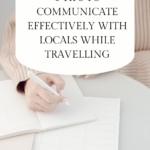Communication is one of the most essential skills every one of us has to master. If you’re a long-time traveler or you’re just new to traveling, it’s even more important to learn how to effectively communicate because, most of the time, you’re going to speak to non-English speakers.
While it’s true that English is considered the international or global language, many people around the world still do not speak English as fluently as you might expect. Not to mention, the English of a different country may have different but crucial subtleties than your own English. Therefore, you should also consider these subtleties to avoid miscommunication.
That being said, if you’re traveling to another country and you’re concerned about how to communicate with locals, here are some tips that you can do.

Learn common words and phrases
One of the common mistakes people think about speaking a new language is that, they think they need to be fluent – that is, learn relatively huge vocabulary, learn basic grammar, etc. – before they can speak the language. But the truth is, you don’t need a deep command of the language to be able to speak it; learning common words and phrases is enough!
Just learning basic expressions such as “hi/hello”, “how are you?”, “thank you”, “excuse me” and “sorry” are enough to get you ahead. Of course, feel free to go beyond the basic expressions. Learn basic vocabularies of categories such as foods, directions, buildings (e.g. hotel, airport, grocery, etc.), and so on. And don’t question words for questions – who, what, when, where, how, and why.
Learn the subtleties of language in certain situations or scenarios
Translation is not just a word-for-word basis. One needs to consider the context, meaning, and subtleties of each. If you’re not careful, you may speak a word (that both you and the locals understand) but may have a different meaning in mind. For instance, when at a barbershop, words such as “short” or “little” may mean you want to cut a little of your hair or you want short hair. If you’re not careful, you may have your hair cut very short when you just want a trim!
By the way, these subtleties can happen both in the foreign language and even in English. One of the ways to avoid this miscommunication is to research how to speak the language in a particular scenario. For example, consider searching the following: “How to speak [language: Chinese, Spanish, Arabic, Russian, etc.] at/during [scenario/situation: restaurant, airport, barbershop, hotel, etc.]” This will help you learn how to use words/phrases as the locals generally understand it.

Use body language and visuals at your advantage
Body language and visual communication can aid in expressing your thoughts that you cannot express through oral communication due to limited vocabulary. Through hand gestures and pointing at things that you’re referring to, you’ll be able to better express your thoughts. In some cases, you may find that locals will teach you the words for something that you cannot describe in words – be sure to take note of the new vocabulary!
Have a language app and translator ready
Having a language app or translator handy is great both for you and the locals. In case both of you cannot understand what you both are trying to tell each other, a language app, translator or pocket dictionary could be a great mediator for both of you.
If the person you’re talking to stares at you blankly, just move on
If you’re trying to speak to someone but he or she just stares blankly at you, just say thanks and move on. Mostly, he or she does not understand you or does not know how to respond to you. It may feel awkward, but it’s not. It’s very normal!

Have an open mind and just learn as you go
Another mistake people make when trying to learn a new language is that they compare the language they’re learning to their native language. In reality, each language has its own subtleties, and you just need to embrace that. Don’t think and translate the language into your own because sometimes, it just does not happen that way.





[…] the country’s language is great because it can help you to effectively communicate with locals as well as understand what’s being said around […]